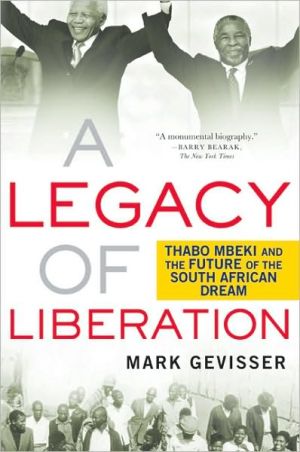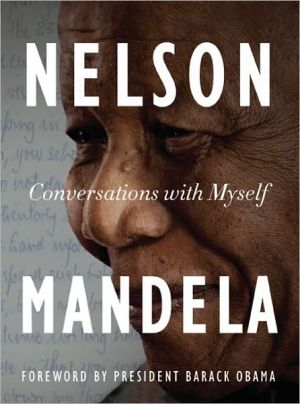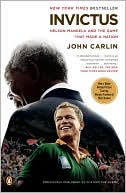A Legacy of Liberation: Thabo Mbeki and the Future of the South African Dream
In This Gripping History of South Africa, award-winning journalist Mark Gevisser traces the family of former president Thabo Mbeki across three generations to make sense of the ANC's legacy and understand the future of the country under current president Jacob Zuma. With unparalleled access to Mbeki and Zuma, as well as other key players in the ANC, Gevisser presents an intimate account of a monumental period that will continue to shape African politics for years to come.
Search in google:
In this gripping social history of South Africa, award-winning journalist Mark Gevisser follows the family of former South African President Thabo Mbeki to make sense of his legacy and understand the future of the country under new President Jacob Zuma. With unparalleled access to Mbeki and Zuma, as well as other key players in the ANC, Gevisser presents an intimate yet accessible account of South Africa’s past, present and future. With his stunning account of the Mbeki family’s history as a backdrop, Gevisser fleshes out a monumental period in world history that will continue to shape African politics for years to come. The New York Times - Suzanne Daley …an impressive feat of journalism…Gevisser writes well, particularly when he is witness to an event, when his narrative leaps off the page.
Author's Note on the Text ixAcknowledgments xiIntroduction: Thabo Mbeki and the South African Dream Deferred 11 The Mbekis: "The Jews of Kaffirland" 122 The Moeranes: Chekhov in the Transkei 193 The New Africans 254 Mbewuleni: "A Place of Seed" 335 Family 406 Queenstown: The African Springtime Orchestra 477 Lovedale: "Africa's Best and Brightest" 508 Fatherhood 589 Johannesburg: Fringe Country 6610 Becoming a Communist: "An Honour Bestowed upon Me" 7411 Into Exile 7812 Sussex Man 8513 Favorite Son 9614 Swinging London: Old Left, New Left 10615 Moscow Man 11616 "Not Quite Home": Lusaka and Marriage 12417 Swaziland: Front Line 13318 Govan and Epainette 14119 The Disappearance of Jama Mbeki 15020 Nigeria: "The Real Africa" 15721 The National Interferer 16522 Party Man 17423 The Diplomat 18124 The Seducer 18925 Parallel Paths to Power 19926 Reunions 20827 Coming Home 21428 Sidelining 22529 Into Power 23430 Transition: The Battle Over the Economy 24631 The Arms Deal: South Africa's Poisoned Well 25632 Mandela and Mbeki: "One Good Native" 26133 Mbeki and AIDS: "Yes, We Are Diseased!" 27634 Mbeki and Zimbabwe: "Red-Telephone Diplomacy" 29735 Home 305Epilogue: Thabo Mbeki, Jacob Zuma, and the Future of the South African Dream 320Notes 346Bibliographical Notes 366Index 369
\ From the Publisher“Gevisser, calling on a vast amount of research, is able to assemble a compelling explanation of this most impenetrable persona.”—The Nation\ “A Legacy of Liberation is memorable and definitive. Accompanying Mbeki on his life journey, Gevisser is both informative and moving, passionate and dispassionate... Obviously we cannot be brought to pardon or sympathise with Mbeki’s estrangement from Mandela and his stance on Aids or on Zimbabwe, but Gevisser helps us to understand where they come from, and how – and why – he has developed such seemingly monstrous attitudes...Few books in recent years have managed to bring the reader to such a deep and disquieting understanding of Paton’s ‘beloved country’.” Andre Brink, Daily Telegraph\ “The best [of four new books about South Africa], Mark Gevisser's A Legacy of Liberation: Thabo Mbeki and the Future of the South African Dream seeks to understand how a man who came to power with so much goodwill behind him is today regarded with hostility... Gevisser carefully listens to his subject and those around him before artfully dissecting his thinking.” Chris McGreal , The Observer\ “Irresistible detail about Mbeki in Britain in the 1960s” Stephen Robinson, Sunday Times\ “An epic biography”—Matthew Kaminski, The Wall Street Journal\ “An impressive feat of journalism...Gevisser writes well, particularly when he is witness to an event, when his narrative leaps off the page…offers some intriguing insights.”—-Suzanne Daley, New York Times Book Review\ “There’s still a tragic element in the multilayered narrative Mark Gevisser has painstakingly constructed over a period of eight years [with] Mbeki, who had scratchy relations with the press. The version of Mark Gevisser’s book that now appears here after Mbeki has been driven into sullen private life covers the final stages of his fall, filling the gap in the original, and still come in at less than half the length of the South African edition. Only specialists will miss the details that have been condensed here or hacked away.”—Joseph Lelyveld, New York Review of Books\ “A monumental biography”—Barry Bearak, The New York Times\ “A judicious and an eye-opening account of a life intersecting history at the most profound level.”—Publishers Weekly\ “One of the great epic books to come out of South Africa since the end of apartheid. Rigorously reported, beautifully written, A Legacy of Liberation is at once a rich social history of the black experience under apartheid—as seen through its leaders, movements and people— and a brilliant expedition through the country's political and personal landscape, past, present and future.”—Katrina Vanden Heuvel, publisher of The Nation and editor of A Just Response and a Dictionary of Republicanism\ “If Thabo Mbeki has been an enigma to the West, no one better explains him, how he got that way, and how it affected his place in the history of South Africa—old and new—than Mark Gevisser. Exhaustive research, incredible and impeccable contacts and the skill of a gifted writer and analyst combine to make this one of the best chronicles of a man and a movement in our time.”— Charlayne Hunter-Gault, Special Africa correspondent, NPR and author New News out of Africa: Uncovering the African Renaissance\ “A landmark biography that provides invaluable insights into the personality, politics, and eventually the legacy of one of Africa’s most brilliant yet controversial leaders. There are lessons here that go well beyond South Africa.” — Princeton Lyman, Council for Foreign Relations and Former U.S. ambassador to South Africa.\ “Gevisser's superbly articulated and carefully dispassionate biography does Mbeki justice, warts and all. The author well captures the earlier skilled, charming, and manipulative diplomat — the public face of the ANC in exile. He understands how Mbeki became a communist and how he left the South African Communist Party, why he succeeded so dramatically as president, and ultimately why the enemies lurking within the ANC eventually pulled him down.”—Choice\ “This is the finest book I have read out of post-apartheid South Africa. Mark Gevisser makes sense not only of Thabo Mbeki but of the struggle itself, and he does so in lucid, brilliant prose.”—Lynn Freed, author of The Servants’ Quarters\ “This extraordinary biography draws the reader into the multilayered world in which Mbeki rose to leadership and shaped the destiny of millions. A splendid contribution to our understanding of contemporary South Africa.”—Gail M. Gerhart, author of Black Power in South Africa\ “Mark Gevisser has given us a wonderfully readable study of a powerful man's character: he shows how Thabo Mbeki shaped, and was shaped by, South Africa's troubled history. After a decade interviewing key players in the liberation struggle and their sometimes forgotten families, Gevisser writes with both compassion and a keenly critical eye. A fine wordsmith with an eye for evocative detail, he exposes the demons besetting the South African dream. A Legacy of Liberation is crucial for understanding what lies ahead for South Africa in the twenty-first century.”—Diana Wylie, author of Art and Revolution\ "[Gevisser] seeks to understand how a man who came to power with so much good will behind him is today regarded with hostility... Gevisser carefully listens to his subject and those around him before artfully dissecting his thinking." —The Observer\ "[A] stunningly good read." —The Herald (Glasgow)\ Praise for the South African Edition\ “Probably the finest piece of non-fiction to come out of South Africa since the end of apartheid.”—Martin Plaut, Times Literary Supplement\ "Cerebral yet intimate, and beautifully written."—Richard Calland, Mail and Guardian\ "Anyone who wants to go beyond those clichés, and also to understand what has happened in South Africa since the end of white rule should read [this]. In the process they will get swept up in an extraordinarily compelling and at times infuriating and tragic story… Far and away the most authoritative book on Nelson Mandela’s successor…Gevisser – one of South Africa’s foremost journalists – writes with passion and conviction…Neither simplistic nor synthetic. Rather it is one of the great explanatory narratives of South Africa over the past 60-odd years."—Alec Russell, Financial Times\ "Retraces in great detail the president's life from his childhood in rural Transkei to his 28 years in exile and his ascent to power. In the process he sheds considerable light on more than half a century of South Africa's difficult history. … essential reading for anyone intrigued by South Africa's complex philosopher-king."—The Economist\ "Deep and fascinating [study] ... a human portrait of a man variously called an enigma, Machiavellian, an intellectual, a visionary and Stalinist.”—The Times (SA)\ \ \ \ \ \ Suzanne Daley…an impressive feat of journalism…Gevisser writes well, particularly when he is witness to an event, when his narrative leaps off the page.\ —The New York Times\ \ \ Publishers WeeklyScion of a once prosperous family impoverished by apartheid, former South African president Thabo Mbeki's ambition as a revolutionary leader was tightly tangled with his family's history and (often painful) influence, contends South African journalist Gevisser. Mbeki's "dislocated, in effect parentless childhood" and early exposure to Christian, Communist and nationalist ideals laid the ground for his first student actions against systemic injustice; exile in 1960s England, Moscow and sub-Saharan Africa; his absorption of Black Power and Black Consciousness ideas; and his tumultuous return through the top ranks of the African National Congress (ending in 2008's ignominious loss to rival Jacob Zuma). The author argues that the controversial leadership of the constitutionally reserved and secretive Mbeki reveals a deep "disconnect" born out of his "traumatic past" that fed his service to the ANC: a "movement that was his family... that ultimately rejected him" and prevented him from putting his "breathtaking vision of the future" into practice. While Gevisser's speculations on Mbeki's psychological makeup might put off some readers, the painstakingly researched narrative remains a judicious and an eye-opening account of a life intersecting history at the most profound level. (Apr.)\ Copyright © Reed Business Information, a division of Reed Elsevier Inc. All rights reserved.\ \ \ \ \ Kirkus ReviewsBased on several face-to-face interviews, The Nation Southern Africa correspondent Gevisser offers a critical, fully fleshed look at former South African President Thabo Mbeki..Mbeki grew up the son of teachers, shopkeepers and activists in Mbewuleni and was educated in England. His education in Sussex, and later at the Lenin Institute in Moscow, were sponsored by the African National Congress (ANC), under the aegis of elder Oliver Tambo. His father Govan's political activism in the ANC had led to his arrest and imprisonment, along with Nelson Mandela, on Robben Island for more than 20 years. Mbeki and rival Chris Hani were the two youngest members of the ANC leadership working in exile at the headquarters in Lusaka, Zambia. Mbeki served as an envoy to other African countries, political secretary and propaganda chief, until the ANC leaders were allowed to return to South Africa in 1990. Mbeki's urbane, "seductive" manner proved particularly effective in assuaging whites' fears about black leadership and violence. Despite his ambivalence about sharing power, Mandela chose Mbeki as his deputy in 1994. Assuming the presidency in 1997, Mbeki ruled by a "workmanlike technocracy," helping to solidify the black middle class and implement an empowering "African Renaissance." Yet his woeful mismanagement of the AIDS crisis, advocacy of a disastrous arms deal, support for Zimbabwe dictator Robert Mugabe and oppressive political control led to his fall from power in 2008. Gevisser skillfully examines Mbeki's legacy within the context of a complicated, still uncertain South African history..Densely packed research in a well-organized package..First printing of 30,000.\ \








